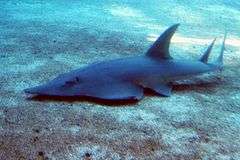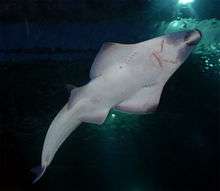Giant guitarfish
| Giant guitarfish | |
|---|---|
 | |
| Scientific classification | |
| Kingdom: | Animalia |
| Phylum: | Chordata |
| Class: | Chondrichthyes |
| Subclass: | Elasmobranchii |
| Order: | Rajiformes |
| Family: | Rhynchobatidae |
| Genus: | Rhynchobatus |
| Species: | R. djiddensis |
| Binomial name | |
| Rhynchobatus djiddensis Forsskål, 1775 | |
The giant guitarfish (Rhynchobatus djiddensis) is a species of guitarfish in the family Rhynchobatidae.
Taxonomy and range
The giant guitarfish was previously believed to range throughout a large part of the Indo-Pacific, but recent evidence has shown that it, as traditionally defined, actually was a species complex consisting of 4 different species.[1] In addition to the giant guitarfish, this complex includes the white-spotted guitarfish, the broadnose wedgefish and possibly the smoothnose wedgefish. With these as separate species, the giant guitarfish has a relatively restricted range: It is found only in the Red Sea and the tropical western Indian Ocean as far south as South Africa.[2]
Description
A large fish reaching up to 3.1m long and weighing as much as 227 kg. The colour underneath is white and overall dark greyish or olive above. Large individuals lack the distinct white spots of the closely related white-spotted guitarfish (though some white-spotted guitarfish are essentially unspotted too). It is ovoviviparous, and a female can give birth to litters of up to 10 young.[2][3]
Diet
The giant guitarfish feeds on bivalves, crabs, lobsters, squid and small fish.[2][3]

Habitat
It is a shy fish, found from 2m to 50m depth, inhabiting areas with sandy sea floor. These are generally around coastal reefs or reef flats, but they will sometimes venture into the brackish waters of estuaries.[2][3]
Interaction with man
The giant guitarfish is harmless to humans. It is listed as vulnerable on the IUCN red list as its population are believed to have declined significantly due to unregulated high levels of exploitation for its flesh and fins;[1] the latter for shark fin soup. Its low fecundity and presumed slow growth rate make it highly vulnerable to unsustainable exploitation.[1]
See also
| Wikimedia Commons has media related to Rhynchobatus djiddensis. |
| Wikimedia Commons has media related to Rhynchobatus. |
References
- 1 2 3 Dudley, S.F.J. & Cavanagh, R.D. (2006). "Rhynchobatus djiddensis". IUCN Red List of Threatened Species. Version 2006. International Union for Conservation of Nature. Retrieved 28 September 2009.
- 1 2 3 4 Froese, Rainer and Pauly, Daniel, eds. (2007). "Rhynchobatus djiddensis" in FishBase. 7 2007 version.
- 1 2 3 Lieske, E. and Myers, R.F. (2004) Coral reef guide; Red Sea London, HarperCollins ISBN 0-00-715986-2
